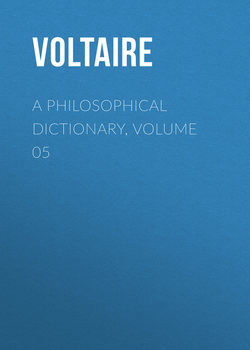Читать книгу A Philosophical Dictionary, Volume 05 - Voltaire, Вольтер - Страница 8
FERRARA
ОглавлениеWhat we have to say of Ferrara has no relation to literature, but it has a very great one to justice, which is much more necessary than the belles-lettres, and much less cultivated, at least in Italy.
Ferrara was constantly a fief of the empire, like Parma and Placentia. Pope Clement VIII. robbed Cæsar d'Este of it by force of arms, in 1597. The pretext for this tyranny was a very singular one for a man who called himself the humble vicar of Jesus Christ.
Alphonso d'Este, the first of the name, sovereign of Ferrara, Modena, Este, Carpio, and Rovigno, espoused a simple gentlewoman of Ferrara, named Laura Eustochia, by whom he had three children before marriage. These children he solemnly acknowledged in the face of the Church. None of the formalities prescribed by the laws were wanting at this recognition. His successor, Alphonso d'Este, was acknowledged duke of Ferrara; he espoused Julia d'Urbino, the daughter of Francis, duke d'Urbino, by whom he had the unfortunate Cæsar d'Este, the incontestable heir of all the property of all the family, and declared so by the last duke, who died October 27, 1597. Pope Clement VIII., surnamed Aldobrandino, and originally of the family of a merchant of Florence, dared to pretend that the grandmother of Cæsar d'Este was not sufficiently noble, and that the children that she had brought into the world ought to be considered bastards. The first reason is ridiculous and scandalous in a bishop, the second is unwarrantable in every tribunal in Europe. If the duke was not legitimate, he ought to have lost Modena and his other states also; and if there was no flaw in his title, he ought to have kept Ferrara as well as Modena.
The acquisition of Ferrara was too fine a thing for the pope not to procure all the decretals and decisions of those brave theologians, who declare that the pope can render just that which is unjust. Consequently he first excommunicated Cæsar d'Este, and as excommunication necessarily deprives a man of all his property, the common father of the faithful raised his troops against the excommunicated, to rob him of his inheritance in the name of the Church. These troops were defeated, but the duke of Modena soon saw his finances exhausted, and his friends become cool.
To make his case still more deplorable, the king of France, Henry IV., believed himself obliged to take the side of the pope, in order to balance the credit of Philip II. at the court of Rome; in the same manner that good King Louis XII. less excusably dishonored himself by uniting with that monster Alexander VI., and his execrable bastard, the duke of Borgia. The duke was obliged to return, and the pope caused Ferrara to be invaded by Cardinal Aldobrandino, who entered this flourishing city at the head of a thousand horse and five thousand foot soldiers.
It is a great pity that such a man as Henry IV. descended to this unworthiness which is called politic. The Catos, Metelluses, Scipios, and Fabriciuses would not thus have betrayed justice to please a priest – and such a priest!
From this time Ferrara became a desert; its uncultivated soil was covered with standing marshes. This province, under the house of Este, had been one of the finest in Italy; the people always regretted their ancient masters. It is true that the duke was indemnified; he was nominated to a bishopric and a benefice; he was even furnished with some measures of salt from the mines of Servia. But it is no less true that the house of Modena has incontestable and imprescriptable rights to the duchy of Ferrara, of which it was thus shamefully despoiled.
Now, my dear reader, let us suppose that this scene took place at the time in which Jesus Christ appeared to his apostles after his resurrection, and that Simon Barjonas, surnamed Peter, wished to possess himself of the states of this poor duke of Ferrara. Imagine the duke coming to Bethany to demand justice of the Lord Jesus. Our Lord sends immediately for Peter and says to him, "Simon, son of Jonas, I have given thee the keys of heaven, but I have not given thee those of the earth. Because thou hast been told that the heavens surround the globe, and that the contained is in the containing, dost thou imagine that kingdoms here below belong to thee, and that thou hast only to possess thyself of whatever thou likest? I have already forbidden thee to draw the sword. Thou appearest to me a very strange compound; at one time cutting off the ear of Malchus, and at another even denying me. Be more lenient and decorous, and take neither the property nor the ears of any one for fear of thine own."
